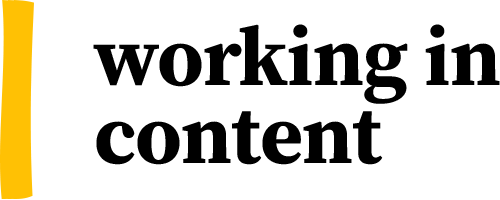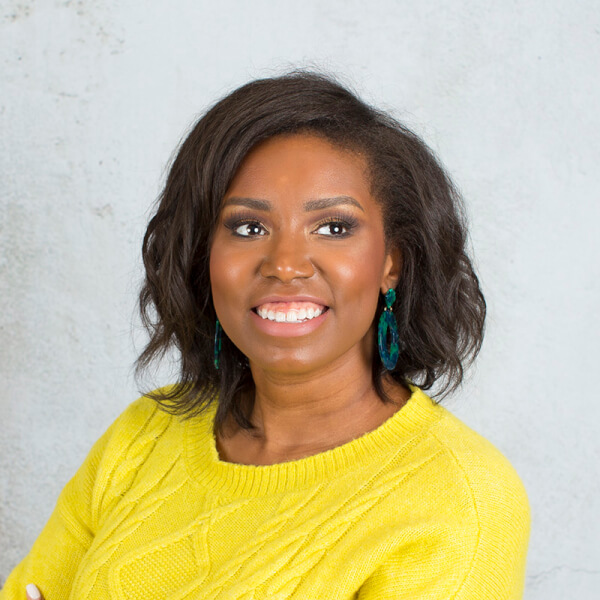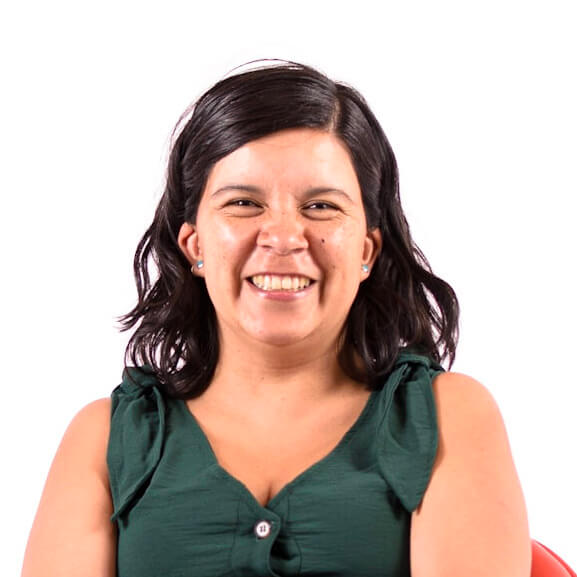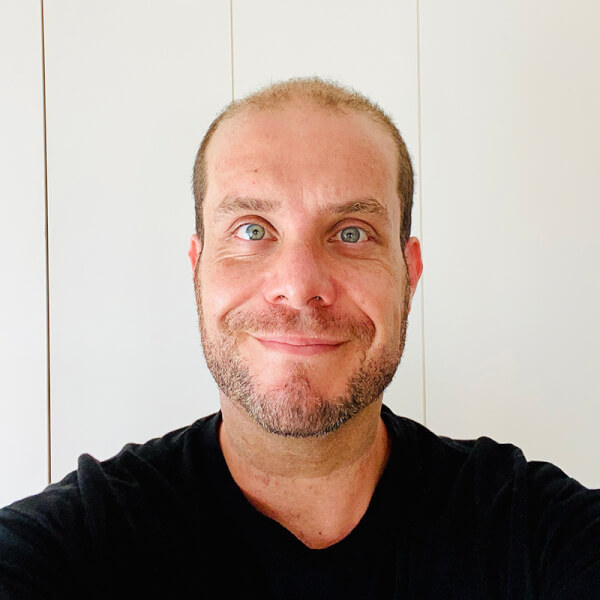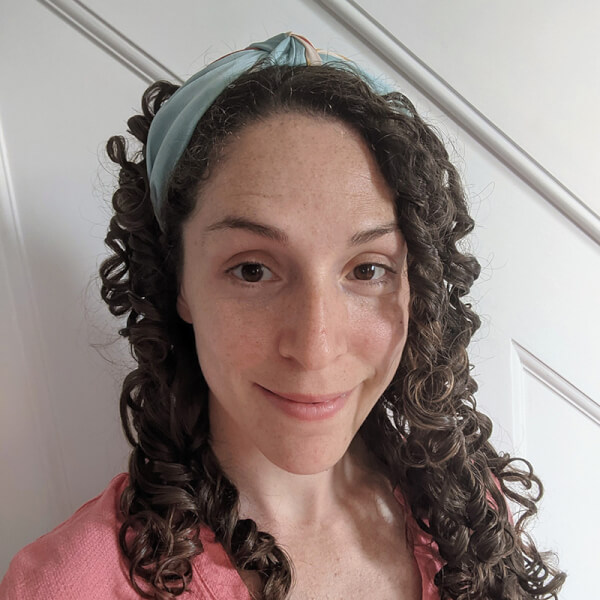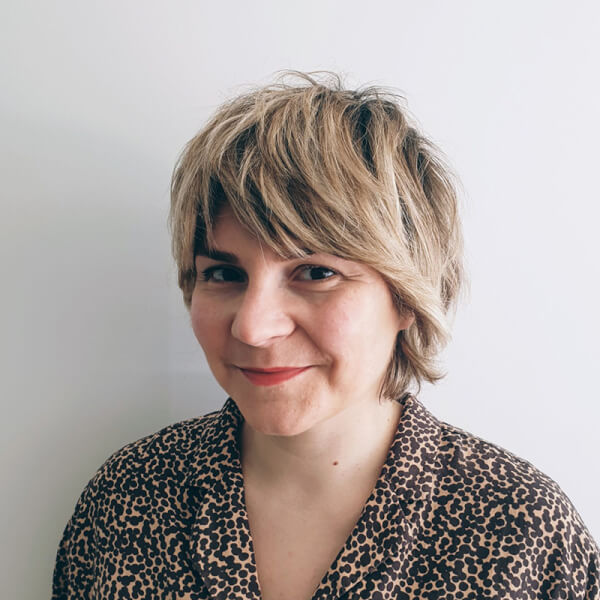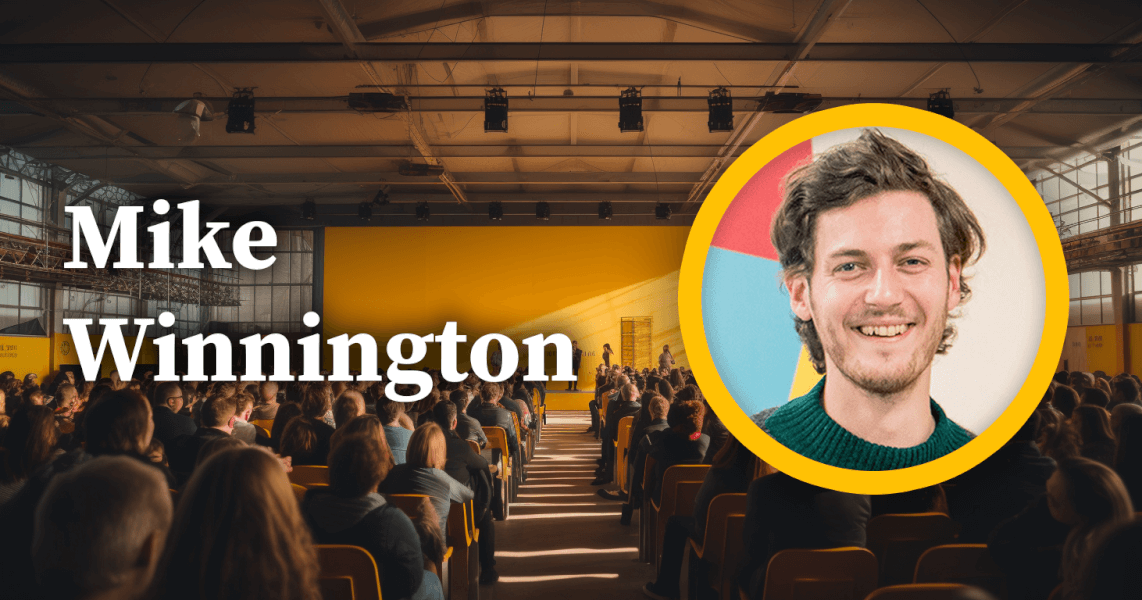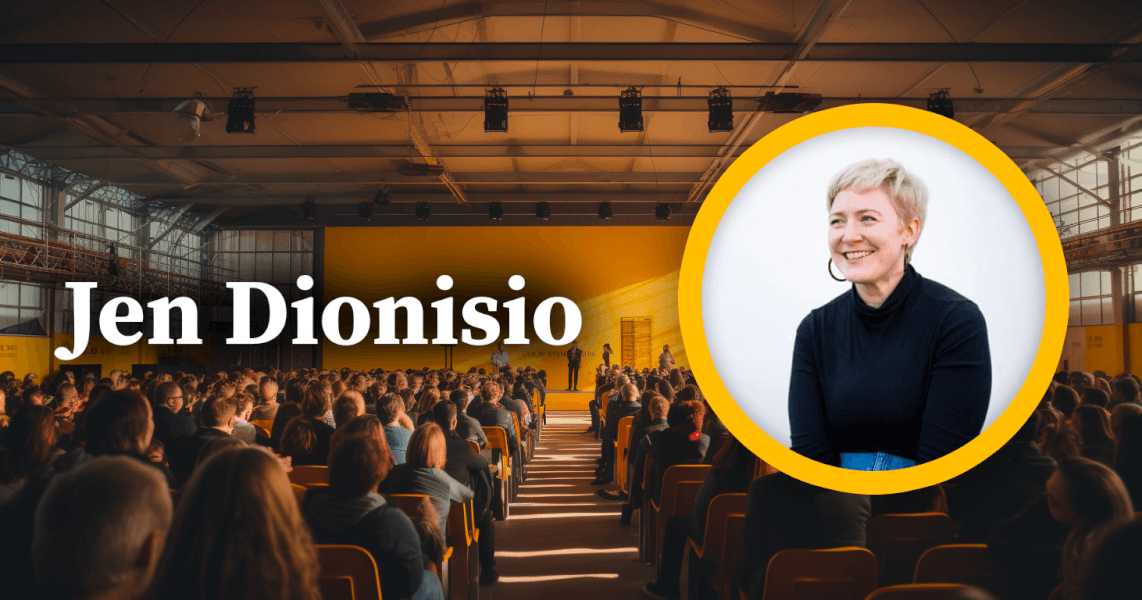In the twelfth video of our Perspectives series, we feature a panel discussion with Jordan Craig (panel host), Director of Content Design at Twitter; Andrea Zamora Acosta, CEO of a UX consultancy in Santiago, Chile; Mario Ferrer, Staff Content Designer at Shopify; Sarah Key, Lead Content Designer at NHS Blood and Transplant; and Camille Promérat, a freelance UX writer and content ops specialist based in Paris. The panelists share their diverse experiences and insights on leadership, covering topics such as navigating imposter syndrome, celebrating wins, and the importance of self-care.
[Titles correct at the time of recording]
Meet our panelists
[Titles correct at the time of recording]
About this panel
In this insightful panel discussion, the speakers delve into their personal leadership journeys, sharing valuable lessons learned along the way. They discuss the challenges of navigating imposter syndrome, a common experience among professionals in the content design field. The panelists emphasize the importance of celebrating wins, both personal and team-based, as a means of overcoming self-doubt and fostering a positive work environment.
Throughout the conversation, the speakers also touch on the significance of effective communication, particularly when it comes to managing remote teams and collaborating with stakeholders. They share practical strategies for mentoring team members, providing support, and creating a culture of growth and development.
Additionally, the panelists discuss the crucial role of self-care in maintaining a healthy work-life balance and preventing burnout. They offer insights on setting boundaries, prioritizing well-being, and finding ways to recharge and stay motivated in demanding roles.
By sharing their diverse experiences and perspectives, the panelists provide a wealth of knowledge and inspiration for content professionals at all stages of their careers, offering guidance on how to navigate the challenges and opportunities of leadership in the field.
Other videos in this series
Christina Vasilevski shares tips on how people with ADHD can thrive in content design, emphasizing how their unique abilities can be leveraged to create clear, concise, and user-friendly content.
Jeneba Wint shares innovative strategies for career development, using the concept of a 'Minimum Viable Product' (MVP) from product management.
Katrin Suetterlin explores the complexities of neurodiversity in the workplace, emphasizing the role of inclusive leadership and the need for a nuanced understanding of neurodivergent experiences.
About Perspectives Conf
This talk is part of Track #4 - Preparing for leadership of the 2022 edition of our conference.
Perspectives Conf is the world’s first event specifically focused on the careers side of content. It’s been carefully curated to help people at all levels navigate the many facets of working in content – from being the first content person to hiring and growing a team.

Transcript of the talk
00:01 Hi, everyone. Welcome to learnings and leadership things you've learned along the way and what you wish you knew before. My name's Jordan Craig, my pronouns are she her and I currently lead content design at Twitter.
00:13 I'm thrilled to be here today. Um, I'm coming to you live from Washington DC and I have a lovely international panel.
00:20 Um, and we're really all excited to talk about the things we've learned in leadership. And I want to caveat before we jump into everyone else that being in leadership does not necessarily mean being a manager or anything like that, but definitely thrilled to be chatting with some of the folks here.
00:34 So I'm going to actually pass the mic to Andrea to introduce herself.
00:39 Uh, thank you. Well, my name is Andrea Zamora. I am CEO of
00:58 So I'm so happy to be here today.
01:01 Awesome. Thanks Mario. Passing the mic to you.
01:06 Thanks Jordan. Hi, um, I'm Mario Ferrer I'm originally from
01:13 Um, I'm currently working as a staff content designer over at Shopify and I lead the Content Design Espana. Which is one of the biggest ones we have on this side of the Atlantic.
01:24 I'm just thrilled to be here and be able to share a bit like you were saying, right. That there's other paths to leadership that doesn't have to be just management.
01:32 Thanks Mario. Sarah. Welcome.
01:34 Hi, I'm Sarah Key. My pronouns are she her, I I'm based in the UK, not far from Bristol, which is in Southwest of the country, I'm, English and Armenian.
01:46 Um, and I am the lead content designer at NHS Blood and Transplant who manage blood and organ donation across many parts of England, Wales, Scotland, and Northern Ireland, UK, slightly other super excited to be here.
02:03 Awesome. And finally, Camille,
02:06 Hi. Hi. You mind reading? Nice to be like really nice to be here. Um, so I'm Camille Promerat I'm based in Paris.
02:13 Um, I'm your feelings, UX writer and content ops, uh, person. Um, I've been, um, a freelancer for quite a few years now.
02:23 Um, and I'm really happy to share exactly what you mentioned that leadership is not necessarily managing a team and like Mario also co-run a meetup that's called UX writers FR um, in Paris and in France.
02:38 Awesome. I love that we all have different positions. We've gotten to our positions in different ways. So I really love to walk through and just opening up the conversation, how we, our path to leadership.
02:50 So tell me about your path to leadership in 60 seconds or less. Um, Mario, I'll start with you.
02:56 Sure. For me, it's been like a, a winding road because I originally come from like advertising background. And back then, when I switched over to what used to be UX writing or and now content design, there was not that many resources or not that many teams.
03:09 And I've been a team of one for so many years that it was hard to like keep on advancing to a leadership position, right?
03:15 So at least here in, in, in Europe it felt like we were setting the foundations and it come to a point like almost 10 years after that we can actually take those learnings and share them with the community that we have and with the teams that we're working on.
03:28 So I went from mobile gaming company to a travel company back to mobile gaming. And now e-commerce over at Shopify, which they're from the other side of the world.
03:35 So that's a bit,
03:41 Yes. I think my, my path is quite similar to Mario. Um, I was trained as a localization manager and translator, um, switched to writing quite quickly in my career and then ended up, uh, working at Deezer, which is a music streaming company.
03:56 And I was the worst person. Um, doing work within the product within the documentation? So was basically learning as I wrote and also, uh, growing as I wrote.
04:09 So it was, I was doing the IC part and the leadership part. So I think it was, a mix of work and luck, um, for us in Europe that we, we, I was a team of one like Mario for a long time and in the end right now, um, uh, coaching teams, empowering teams.
04:28 Um, but yeah, uh, it's been, yeah, it's been a winding road it's been a sketchy sketchy road, but I think that's, what's interesting, um, about, um, you know, our, um, our field right.
04:42 Definitely. And sketchy is always more fun. So I'm into this sketchy path for sure. Um, Andrea, how about you?
04:49 Well, I started leading in my, their, uh, professional experience, eh, when I was part of digital team of
05:14 So is the most important campaign, um, in my country, um, each year, it rises, uh, nearly 15, uh, 15 million dollar in donations for the people and, uh, business.
05:34 And, um, I learned, uh, to lead, uh, with, uh, some pain, it's, uh, stressful, uh, role. Uh, but I think, um, when I started, uh, my, uh, experience leadership experience, eh, it was on a very competitive, uh, environment for me.
06:01 Um, I need, uh, I needed to learn and empower to myself very fast. Um, it's, uh, a difficult and sometimes, uh, but I had to briefly, eh, empower myself and position myself in these content.
06:23 Uh, for my, uh, in my, uh, today I lead a team of 14 people. Eh, I have been, uh, learning to let it go some things, uh, to trust, uh, to, uh, in my team work, um, a favor.
06:47 They are, eh, they are autonomy and self management, eh, and eh, I think, uh, this is a difficult thing about that.
06:59 Um, I am a mom too a mother and to of two kids, um, it's the same experience, eh, sometimes. So, uh, I learned to let it go, my kids, my team, uh, at the same time,
07:17 I love that. I think that, um, learning to let go is obviously a major sign of leadership and growth. So I I'm, I'm in the same place for sure.
07:25 Sarah, what about you?
07:27 Um, I have, like, I think everyone had a bit of a squiggly career I studied architecture and graduated in a recession when no one was building.
07:38 So, um, by that stage, I was starting to question whether buildings were what I wanted to design. I'd always been interested in design right from, the, start Quite long time.
07:51 I think I've had imposter syndrome about my start and not having an academic background in writing or content design. that, actually is giving me a fantastic and foundation for user centered design.
08:04 And, um, I fell into marketing, um, mainly for charities, um, everything from leading teams of up to 30 and, um, alumni calling campaigns for universities and private schools through to being a press officer for my local police force for a year.
08:20 Um, and then working more in digital marketing for charities, which led me into the National Health Service or NHS here in the UK, um, uh, kind of regional level and now working in national level.
08:34 Um, and for me, it went from being managed by someone to managing my equivalent in another role. I'm now managing five, so it's no one teaches you how to lead.
08:46 It's a baptism of fire. Um, so yeah, it's, it's been an interesting road, but a really, really positive one. I'm very grateful for the opportunities that
08:57 I, um, similarly to Camille, I've always considered myself to be a words person, and I've always been a people manager since I started my career.
09:04 I've managed teams of up to 50 at one point. And one of the things that's always really rung true to me is, am I doing this job really well?
09:14 Am I showing up as the leader that I want? And then I sometimes have to check that, like, there is a little bit of this imposter syndrome to your point, Sarah, that you don't necessarily know you're going through until you're kind of on the other side of it.
09:26 So as leaders, I'd actually love to talk a little bit about how you all manage the imposter syndrome that you sometimes might feel.
09:33 Um, so Andrea, let's start with you.
09:36 Oh, well I think, uh, imposter syndrome, it's, it is a constant every day almost. Uh, especially when someone on my team, for example, ask me about, uh, design process or design decision.
09:54 Uh, I always think, uh, I don't really know, uh, and this, uh, all of the question of things I think, I don't know everything, but, uh, for one reason my team thinks, um, I know, so, um, um, I have no formal leadership, um, if for studies or formal, eh, I have been learning for, uh, another coworkers
10:27 , um, especially, uh, uh, another, a women in leadership position. Um, and it was a very beautiful process, a process for me.
10:40 Um, um, imposter syndrome for me, it's hard to manage, um, sometimes, eh, but I think, eh, it is important to trust, uh, um, over intuition or, uh, feelings about a process or people of my team.
11:04 Um, with, uh, in favor, eh, you can raise a question about, uh, the project or process, uh, and solve them with others.
11:17 Uh, I think we need to learn, uh, we don't, uh, have, um, loneliness, uh, leadership. We need a team, we need, uh, coworkers, we need other, eh, leads for other teams or other consultancies in my case.
11:39 Um, in the worst case, eh, you can always say maybe when you don't have the answer for the, for the question of your team maybe, or maybe not, I'm trying to do something about it.
12:00 Eh, this, eh, I, I think is my biggest, um, um, uh, lesson from this process maybe can be, do anything or maybe not do anything.
12:22 And it's fine. Um, it's part of this process, um, eh, when, uh, we have, uh, this, uh, conviction in our work, uh, everything it's, uh, moving to the goal we have, um, I think is the only way for me.
12:48 Yeah, I'd agree with that. And I think picking up on what you were saying Andrea that there's a certain amount of vulnerability in being a leader.
12:57 Um, and for me, as you were saying, it's totally okay to, cause I find the same thing that sometimes people come to me for an opinion.
13:06 And, um, I, my immediate response is, oh, I don't know if I know, um, um, having the, finding the confidence to be vulnerable and say, I don't have an answer for you right now.
13:19 Um, it was quite interesting though, in a, in a previous job working more generally in marketing for charity, um, I was asked, I was working with, um, a manager who, um, he pointed out that whenever he asked me for something even slightly complex, so you always say you weren't able to do it.
13:37 And then you come to me with something fantastic.
13:39 So I don't want to be rude, but you might maybe sit with that and maybe you're underestimating yourself. Um, which I, I think I was, I was trying to, um, set expectations and not put pressure on myself when actually what I was producing was good.
14:00 So having, um, being okay with that vulnerability, um, I know there's a balance. I do think that, um, it's important to give him a measured, somewhat measured response to your team, not, um, an instance of one-on-one that's robotic, but, um, you know, there are times when, as a leader, I do think it's
14:19 important to protect your team. So I don't think, I don't feel like I can be 100% honest all the time.
14:26 Um, in certain situations there are going to be times when I have to swallow that think. Right, okay. Park that for later and I'll need to work on that myself.
14:36 Um, but sometimes I think that imposter syndrome for me is highlighting, um, an area where I'm very aware of something.
14:44 I don't know. Um, and when I realized that it just gives me in motivation to be able to go my research site rather than sitting with something and thinking, well, I just feel really uncomfortable trying to go with a proactive approach of, okay, what can I learn here?
15:01 Or who can I tend to were saying Andrea if we can, if we've got peers, um, like, like all of you or, um, other people in similar situations, your network is so, so important.
15:13 And that's why events like this are fantastic because it gives us an opportunity to connect with others that are in a similar position.
15:20 Um, and I definitely say reach out to us in the Q and A, on Slack, if you're in a similar situation to us, or if you've got questions, do you think about taking a step into leadership?
15:29 Talk to us, um, let us be your network. If you're struggling with imposter syndrome, I think it's a constant battle.
15:36 Yeah. Completely agree. Yeah, go ahead. Yeah, same. I was going to say it's a continuous battle, especially for women and especially in tech, uh, where it's, um, I don't know if I, I w I was just saying, I think in France companies tend to have like a balance between men and women, but it used to be
15:55 probably 80 to 90% male and 10% female. So it's really hard. Um, I also, I have a different view as a consultant, um, because, um, I'm usually hired to solve problems right away, or that's what clients are looking for.
16:12 And, um, sometimes they will ask for them. They expect me to know my, like my thing, my stuff, but also their context.
16:22 And that's something you cannot understand in a day or two. Right. Um, so it, it usually triggers like major imposter syndrome and stress.
16:31 Um, and before I would say, yes, yes, yes, yes, yes, yes.
16:35 Everything saying, I'll figure something out and, you know, um, become really stressed about it. Not be able to sleep or, you know, doing loads of research to find a solution.
16:46 But I feel that as I got older and you mentioning how you mentioned having kids, and I think it's also helped me just chill about everything.
16:56 And right now, if I don't know something, I just say, I don't know, but I'm sure we can figure something out together sometime in a few days in a few weeks in a few months.
17:07 Um, and the response I get is, oh, okay. And you just realize that not knowing is okay, not knowing doesn't matter, but you know, if you combine several brains together, there's no reason why you'll fail.
17:24 So it's also being really practical really rational. Um, and I think people trust me more for that.
17:31 And of course, sometimes the busting, syndrome comes back, but I have a very dear friend who does the exact same job as me.
17:39 She's called Amandine. She co-runs the French meetup with me. And we, we just find that every time there's like a imposter syndrome coming in, we just chat each other.
17:50 And usually we don't have it at the same time. So we encourage ourselves. And sometimes, you know, she will say, why are you thinking about this?
17:58 It makes no sense. And then two weeks later we have the, you know, the exact same, same situation the other way around.
18:05 So I agree with Sarah, it's just about finding whether fellow writers that, you know, in real life or fellow writers from around the world, or even other leaders from other fields that we'll just face the exact same thing as you do.
18:21 And just talk about it, even as a consultant. Sometimes I just talk about this with clients. I just realized that my clients that are in the C-suite face the exact same thing.
18:32 So, you know, um, knowing that people that have really high positions, the company, if you feel the same thing as you is super comforting.
18:42 So being able to talk about it very openly, um, I think is key to everyone within the company.
18:50 Awesome.
18:52 One last bit, because I want to bring it like a huge plus one, but I don't have anything to do it with.
18:57 So plus one, everything you said, thank you so much. I think we're, we're always in this point that we're content people working at a product design world, which means we have to work twice as hard because we need to win that credibility.
19:12 Like a, we're not just doing the words we're doing the design bit of that content also. So it's about on top of doing a regular day-to-day job.
19:20 It's being able to like, yeah. Explain to people why, what we're doing makes sense from like, from a very tactical level, all the way to a very strategic level.
19:29 So the beauty about having these communities is about reaching out because we're super, super, super, super grateful about when people come to us doubts, and we'll try to help them up because we've been there.
19:39 And now when we have problems, we'll just reach out to someone else and they'll help us out. So please, don't, don't be afraid.
19:45 Don't be afraid to just reach out. And one last thing, um, what really helped me is change the narrative. It's for me, I'm I have imposter syndrome every single day, but I don't try to manage it.
19:56 I try to navigate it because there's a simple difference with that wording, right? Because when you're trying to manage, you're trying to control and you can't control imposter syndrome.
20:04 You can only learn how to navigate that.
20:07 I agree with that. Um, one of the things that I think maybe you Camille were touching on was like learning to say, you know, I don't know, or maybe, and for me learning to say no to project work has been a very defining moment in my leadership, right?
20:22 Telling my teams that we cannot take on all of these projects we have to do less, better, has been really tough because it's, it's hard to tell someone no, but it's a transferable skill that I took from my previous roles at agencies.
20:36 And when I was working with clients and just simply saying, we cannot do this work well, let's do less much better.
20:42 So I'm curious if anyone else has any additional transferable skills from prior jobs or activities they were doing before they got to their current role.
20:50 Um, Sarah, let's start with you.
20:53 Um, I, I've already mentioned my degree, which, um, architecture or I believe good architecture needs to, you know, put the person at the center.
21:04 And obviously that's something that we're doing day in, day out. Um, and it's, it's been really interesting seeing how the setup of projects.
21:12 Um, my degree and graduation was quite one, um, that the setup of projects, there's quite a lot of commonality and transferable skills from doing that initial site survey.
21:23 Um, so transferable to looking at current context or auditing current content, um, looking at the whole user journey, um, and gathering everything from there to design something that works well and testing it, checking it out.
21:37 They're not just going to go and start laying down foundations straight away. You need to check things, um, has, has really, really helped me.
21:44 I think, um, for me, I feel the benefit of having had quite a mixed route to get into where I am, um, working as a press officer, as I mentioned, got me really used to being put on the spot, um, and working in incredibly stressful situations, um, during critical incidents and dealing with really hard
22:06 questions from journalists.
22:08 Um, all of that has prepped me. And at the time I felt like I was maybe jumping around too much.
22:13 I was needing to take short-term contracts because that was what was available in the employment world here, um, at the time.
22:23 But actually to me, um, it really has its benefits. Um, and as, uh, I suppose my message to anyone who might have been in a similar situation where you feel like maybe you've moved around more than you wanted to.
22:37 Um, that's okay. And I, I know that I come from quite a mixed background, but I look for that in people.
22:44 Um, if you've got a breadth of knowledge, every single thing that you do, you bring, you're bringing your whole self to work.
22:49 Um, don't edit out that fantastic, diverse experience that you might have if you're applying for a job, be honest about it.
22:57 Um, and I, when I applied for the role that I'm doing now, um, I'm indebted to my current line manager who, when, um, I think she asked a question about leadership skills.
23:10 She said, um, you've mentioned that you're a parent, that you can absolutely talk about a scenario that you might've manage as a parent.
23:18 It's fine if it's a work one too. Um, and that gave me permission to not necessarily talk about something from my home life, but from drawing, the breadth of my experience, um, and that's something that I try and take on now, when I'm interviewing people to say, you might have already talked about something
23:37 here. Um, tell me a little bit more about that. It doesn't, you don't necessarily need to focus on the things that you considered to be the work you'll, you'll get gaining skills all over the place.
23:48 So you've got a good tangible example, bring that out, but I think I'm diverting from the original point. I think the, there are so many transferable skills out there that you can bring into work.
24:01 Um, and looking at it as a whole, even down to doing things like I recently started to doing outdoor swimming, um, and for anyone who isn't in the UK, it's cold here and I started in February.
24:15 So I might be a bit mad, but to me it's been incredibly helpful for my mindset to know that I can do something that I didn't think I'd ever be able to do.
24:23 Um, and I've been really amazed at how that's affected my work. Um, it's given me resilience and an approach that I didn't have before.
24:30 Um, so yeah, it's a, it's a topic I find really fascinating that all of the things I think that you do maybe to set up for work like academic study, although it's incredibly valuable.
24:40 Um, I think I'm probably drawing on the skills that I didn't learn in a classroom or in a course more day to day.
24:46 And those are the things that really push me forward as a leader, um, in ways I didn't expect.
24:52 Yeah. Thanks, Sarah. Um, uh, Andrea, I'd actually love to hear your perspective on this too.
24:59 Okay. Um, I studied journalism. Um, there, I learned, uh, to write and communicate. Um, later I did my internship, um, in very remote place in Chile, uh, south of Chile, uh, in a precarious, uh, condition, uh, restricted, um, electricity, um, hours no, internet access, um, maybe rainy and cold weather
25:27 . So it's very hard working space, uh, and that helped me to be able to resolve, uh, issues with a few implements.
25:38 Mario always says, uh, that Latino people, uh, have a talent and that, uh, is solving complex problems in extreme condition, uh, without a little, uh, things.
25:53 Um, so those are implements, uh, in my first, uh, first work experience was a lot of that, um, to be functional in complex contents requires, uh, great raisings, um, the, ability, uh, to focus and prioritize, our, uh, task, uh, my work in vulnerable communities, uh, um, people with high
26:26 illiteracy rates in a local radio, uh, helping learn, uh, to listen and take, uh, people's stories, uh, or ideas, uh, and transform, uh, them into radio, uh, content, uh, in this case, uh, was a prehistoric, uh, podcast.
26:48 Some that, uh, um, that everyone could understand this program, uh, radio, eh, this experience was very important for me and I used, uh, today in my work, uh, because I continue to listen to the people I continue to listen.
27:10 Uh, the people's stories about, uh, product or digital service. Um, I need to research, uh, these stories too. Uh, so, um, then, um, I took, uh, these ideas and transform in words, eh, eh, that everyone that everyone could understand, um, I left the radio and to begin working in user design experience
27:42 , eh, eh, so, uh, it was for me very clear, uh, the possibility to learn, listen, the people took that, um, do my work for write, um, the best words or mirror copies in the user interfaces.
28:09 I always remember that experience because, eh, it was very hard. Um, um, I done with that.
28:19 Um, I'm doing it. So this experience was, um, very important because learning, uh, we need to listen, uh, our user, we lease, we need to listen, uh, what they can do with our products, eh, without that experience, I think my work is very different today because I, maybe I don't, uh, be a good researcher
28:57 or a good, um, eh, translate, uh, person for this idea or these needs for the user to, um, a user experience design process.
29:13 And I think this transformed, eh, is very, um, important and very, um, and helpful for the people. Uh, on the end of the day, I think I was my job, my work, um, um, the people could, uh, understand that, uh, things I write in user.
29:43 Thanks, Andrea. Um, I want to pivot for a sec and talk about projects that we've worked on or projects that have given, you know, our teams extra credit with stakeholders.
29:53 Um, so it could be anything from small wins to really big breakthroughs, but would love to chat a little bit about this.
29:58 So I'll start with Mario.
30:01 Yeah. This ties in a little bit to what we were speaking at the beginning, right? So especially when, like you were a group of one or a small group, you have to prove how you can provide impact to the design team as quickly as possible.
30:13 Right? So it's about figuring out what's the best way to partner with the folks around you, because we're always thinking about what's the best that we can do to design for the people on the other side of the screen for, for our users, but we rarely think about, so the people we design with, right?
30:30 So it's about starting to create those relationships that they see you, not as a, there's an extra step that we have to go through the process, but rather like, oh, wow, the work, the type of work these folks are doing will really help us provide a much better solution.
30:45 So it's always very important to keep a long memory or an extra credit box, or like screenshots, anything that provides you with what, what was the problem that you were trying to solve?
30:58 What was the solution that you proposed? Obviously, if you have any information about what was that process and always like, what were those results?
31:04 Because in the end of the day, you have that mixed bag of a whole bunch of things that you can provide to your team one to hype them, but also to make a business case to like, if you need to grow your team, or if you need, like you were saying, um, focus on less projects, it's very, very helpful to
31:22 be very, very community little, what, what are you doing two what those things that you're doing impacted directly on, on both, uh, the UI, the users experience, but also the people that you work with and obviously the business.
31:37 Yeah. I think that, um, to your point, the importance of communicating those wins are when you're successful is super important.
31:44 So I'd actually like to dig in on that a little bit, and I know Camille, you had some thoughts on the importance of communicating your wins.
31:51 Yeah. So I'm going to give a bit of context, um, here in France. Um, I don't know if it's the same, I would say Latin countries probably.
32:00 It's a very French thing not to celebrate your successes. It's very, very, um, it's seen as bragging. So if something's a success we'll just not say, but, um, you know, in, in the work, like in the, in the workspace, uh, in the professional field, you have to celebrate successes.
32:21 You have to tell everyone what you've achieved. And the thing is content people usually stay aside for many reasons, um, because they're pinged at the last minute or, um, because they have so much work that they don't even have the time to celebrate just once something is done.
32:40 Did you switch to the other task? Um, also this, uh, I think a common trait, um, between content people. So we think sometimes that what we do or what we say is hasn't got a lot of value or, you know, it's so obvious to us that we don't realize how key it is to other people.
33:03 Um, so to be honest, I think I can, most companies, I see, um, we do have the seat as a table, as content people.
33:13 Uh, we just have to basically sit on it and I think that's the metaphor, um, I've seen is that people would be happy to have more content folks, but sometimes people are scared to celebrate or tell what they've been doing.
33:27 So there's some miscommunication, even in some companies, people don't know that content people are there. So we stressed, you know, about sitting on that throne content throne, and just say, we're here.
33:37 And that's what we do. Um, also I always have an issue with the term, uh, evangelizing. That's a term I don't like.
33:46 Um, I really think we have to learn how to communicate what we do well, and that's a skill that sometimes as writers, we don't have, I don't know if it's common, a global thing, but I, I think it's also hard to, to sell yourself, to sell your work.
34:01 So you have to learn to do this. And that's how, um, you know, that's, that's also the, um, the role of good mentoring of having a great manager, a great leader.
34:11 Um, and to be honest, um, in, in most, because I work in tech and I've always worked in tech, we, you know, we, uh, we bow in front of developers, uh, also in, in front of designers, but we have to show people that content is as complex, even more complex and development and all that stuff.
34:32 Um, so we have to bring in all those folks to celebrate with us, uh, or wins because, um, from my perspective, and from my experience, you know, especially developers are fascinated, but by what we build in terms of content, in terms of strategy, in terms of, uh, efficiency.
34:52 So I, I would, yeah, if I had to summarize this, just we have to learn how to communicate and it's not easy.
34:58 So that's why we have to reach out to other folks.
35:02 Yeah. It can be very uncomfortable to actually talk about your wins, but I've learned, especially in scaling my team at Twitter that proving the success of my team, or at least showcasing it, even if it makes me uncomfortable or it might make my team slightly uncomfortable to talk about it, like, look
35:17 what we did. It has been very helpful for us in at least getting head count, advocating for a larger team.
35:23 So to your point, learning how to communicate that in a way that's really effective has been really helpful for the growth of my team at Twitter.
35:30 But I think that that's a skill that you tend to mentor in people. And so do you want to actually take a moment and touch on like what it's like to mentor your team and what that means to you?
35:40 So I'd love to, um, to hear your perspective on this, Sarah.
35:45 Um, so for me, it's contact time with my team is super, super important. We all work remotely. We have not actually met any of them in person.
35:56 Um, and so having that one-on-one time regularly at a time when, um, they it's convenient for them and also works with my schedule so that I know that I can give them that deep focus that they deserve.
36:08 Um, when I started in the organization and we didn't have a scheduled or a set in some organizations mandated, but where I'm working, they don't do that.
36:18 So, um, it was quite nice to be able to join and say, I come from an organization where it's really, it was really important, it was mandated.
36:26 Um, but I'm flexible about how we do that. I'd like to check in with you regularly because you're important. I'm not really checking up on your work.
36:33 I just want to talk about you. That could and that time. Is this for you? We can check in with your work if you want to, but we don't have to.
36:40 And, um, when, when, how often would you like to do that? Everyone has said they'd like to meet fortnightly, and I've always set that with a caveat of if you ever stop serving you, like, if you want to change things, then do, because this is your time.
36:55 Um, it's, it's been fantastic getting to know the team. We ended up talking about a real range of, of topics.
37:03 Um, sometimes someone will come with their to-do list and say, I just need this time with you to help me prioritize, because I'm feeling stressed.
37:09 Other times they'll open up about something that is really troubling them outside of work and that they are. Um, so a great example was when someone came to me and said, I feel like I'm really not performing well.
37:18 Um, you've probably been able to tell, um, this is going on at home. And my response was, you're doing exactly the same fantastic job as you always do, but thank you for sharing with me because it really, really helps.
37:28 It means that I can support you better, and I can look at ways that the organization can support you better.
37:33 Um, and I think it's the case for all of us, but yeah, I'm sure we all have our own challenges as content designers.
37:39 We're constantly advocating for the user and that is exhausting. So just having that time to be able to talk to someone who knows what you're going through is, is really helpful and gives you opportunities.
37:49 As long as you talked about to maybe be a bit vulnerable with that person and to share things that maybe you're struggling with or successes.
37:55 I always try and go with something that I can celebrate if there's an opportunity with them specifically.
38:00 Um, but particularly working in a healthcare sector, um, in the, in the situation that we do, we, you develop quite a lot of vicarious trauma where we're reading and writing about life-threatening situations, quality, really poor quality of life.
38:15 Um, but we don't have, um, we don't have that physically. We're always talking about it emotionally and mentally. Um, we don't have that patient contact that, um, some of the, the incredible clinicians that we work with do, but that builds up.
38:29 And I don't think it's necessarily, I certainly didn't acknowledge it in myself until a few months into the job I'm emotionally exhausted.
38:36 And it was when I appear in it in another department, says, there's this thing called vicarious trauma really, really common in our sector.
38:43 And I was like, oh, that's what it is. So always for me, that's where mentoring sits and it's about those regular check-ins.
38:51 Um, and, and, and being there for them as a person rather than as a manager. Um, but I'm aware that that varies massively.
38:59 So I'm sure someone else has another take on how to do that.
39:02 Yeah, actually, Sarah, to your point, I'd love to talk, um, really quickly, cause I know we're getting close. I mean, we spent like lovely 40 minutes together.
39:10 Um, we're getting a little close to the end of our time, but I'd love to hear from each of you how you take care of yourselves, right?
39:16 Like to your point, we've been all living through a really collective interesting experience. And so as as leaders, it's really important to make sure that we're showing up as our best selves because you can't pour from an empty cup.
39:29 So, um, Sarah, why don't you start tell us what you do to take care of yourself?
39:33 Um, it's super simple, really basic. I'm sure a lot of people think about it or might be doing it already, but I meditate every day.
39:39 Um, I'm currently on day 57 of meditating every day, even if it's just for three minutes, I use the Headspace app, but there's so many out there.
39:47 Um, I'm lucky that they offered it free to people in my position, in the NHS, but there's loads of free ones out there like Calm.
39:54 Um, that's what keeps me going each day.
39:56 Awesome. Mario, what about you?
39:59 For me? It was about finding ways to get out of my mind because even if we're not in front of a computer, we're always working and then you have kids and we've got the household and we've got our spouses and our partners and our lives.
40:10 So it comes to a point where you need to like, stop thinking about it, getting things at the same time.
40:15 So I found it through like, for example, CrossFit and like going out into the forest and running is like, I have to like really focus on what I'm doing or I'm going to get hurt and I've gotten hurt before.
40:23 So that helps me a lot get on my mind. And it helps me actually to relax. Right. And stop thinking about a billion things at the same time.
40:30 Yeah. I'm, I'm in the same boat as you. I'm a big Peloton fan. I'm on my bike or my treadmill pretty much every day, it's really good for me to move my body and get out of my head.
40:40 So I am with you, um, Camille what about you.
40:44 Um, I'm not sports person that much, um, before the pandemic and before having a baby, I would go to gigs a lot.
40:51 I would go to concerts once or twice a week. Um, so when the pandemic, uh, started, I always, I felt pretty stuck at home.
41:01 Um, so I started some weird moments that you can picture in your heads. And I would basically put like a punk or indie playlist in my, uh, on my phone, put my headphones on and dance like for five or 10 minutes just to, you know, be like to let let go of everything and I've still be doing it.
41:27 Even when my daughter was one or two months old, I would just take her with me, put my headphones and dance around and that would actually calm her down.
41:37 So that's really ridiculous to see I must say, but that has helped me, you know, just, yeah, help let go.
41:45 I love that if it works it works. So, um, Andrea, how about you?
41:50 Um, I, um, um, all lady because, uh, gardening, knitting, um, my I'm finishing a sweater. Um, I was, uh, I have, uh, I have two years, uh, knitting my sweater.
42:12 I think I hope finish, uh, one day, I don't know, but it's, uh, um, possibility for me to focus and concentrate in one job to do, um, um, eh, eh, it's helpful for me
42:34 And knitting, knitting. Doesn't lie. You can tell when someone's stressed in their knitting, cause the stitches get closer together. So it's, it's a, it's a good pastime for that.
42:43 Yes. I didn't know. I, uh, for example, uh, yesterday, uh, before to go to the bed, I took my tools.
42:57 Um, transplant, uh, one of my plants I sleep very well night, uh, I have two kids, so it's very hard.
43:08 Um, I focus and concentrate, concentrate or silence. Um, so, eh, gardening is a possibility for me to, uh, silence. Um, no one, um, interrupt my process, uh, for that.
43:27 So
43:27 I have to try that, try that night gardening before bedtime. We, it is time. I am so grateful for the 45 minutes we've gotten to spend together.
43:39 You all have been lovely. Thank you to everyone that has joined us. If you have any questions for us, please feel free to drop them in the Slack channel and we will be around to answer them.
43:48 So thanks everyone. Have a great day.
43:51 Okay. Thank you. Gracias.
Want to know when the next video from Perspectives Conf is published on our website? Sign up for our weekly newsletter in the box below to get notified.
